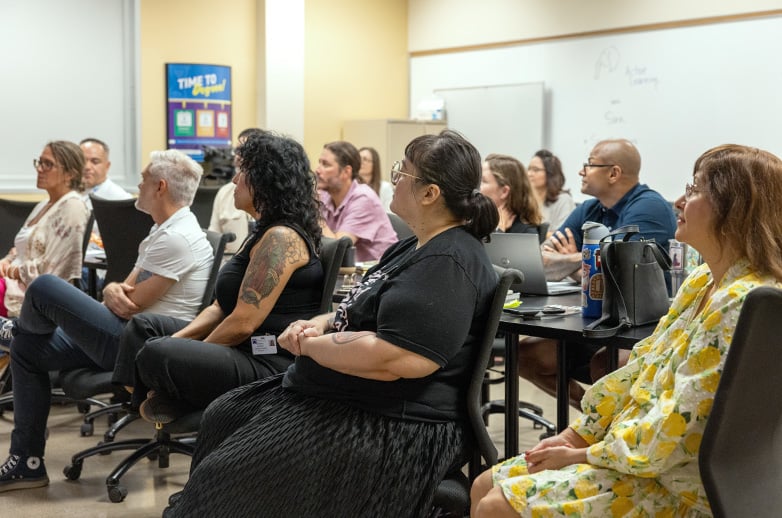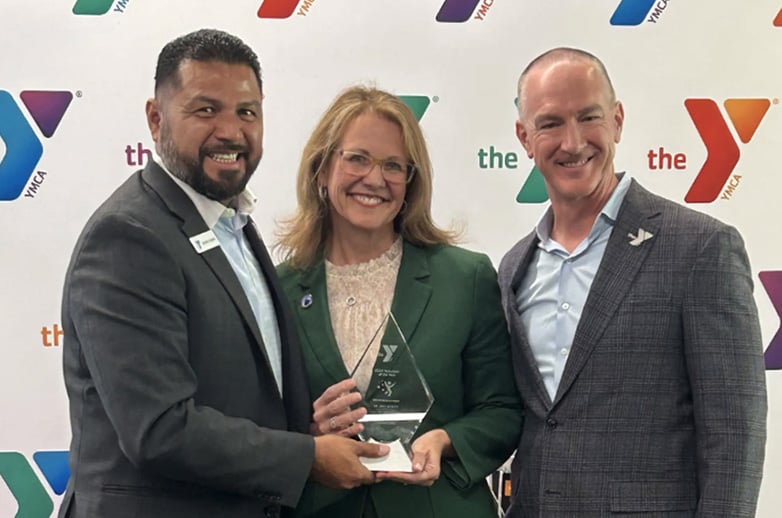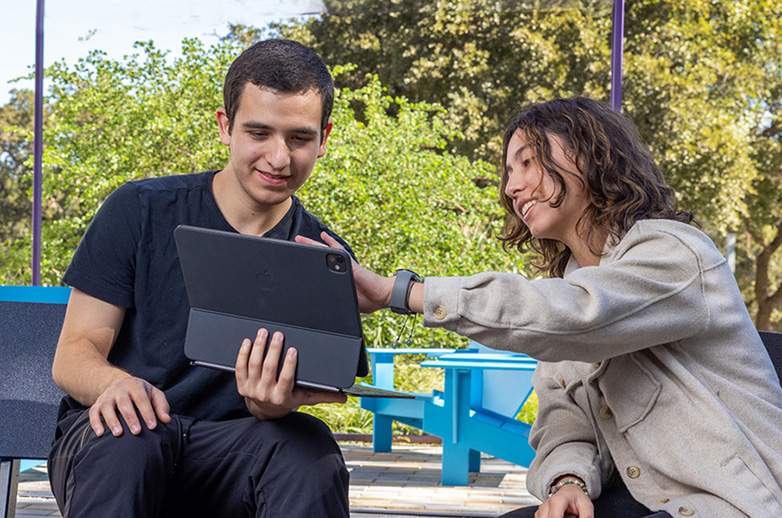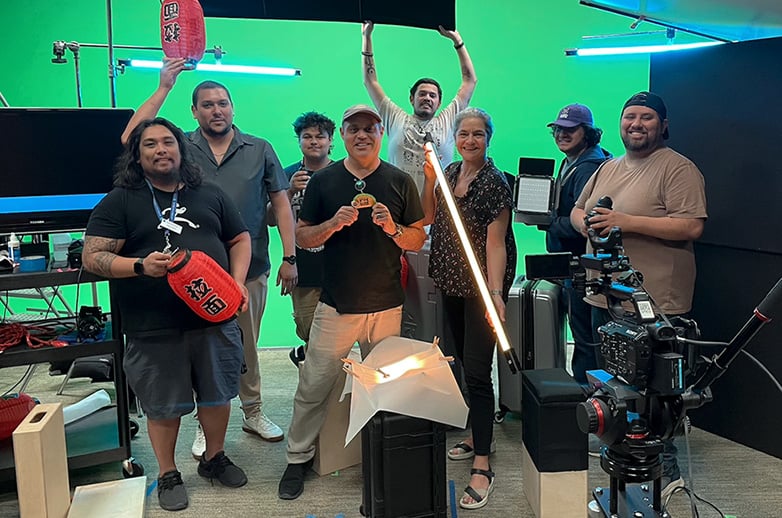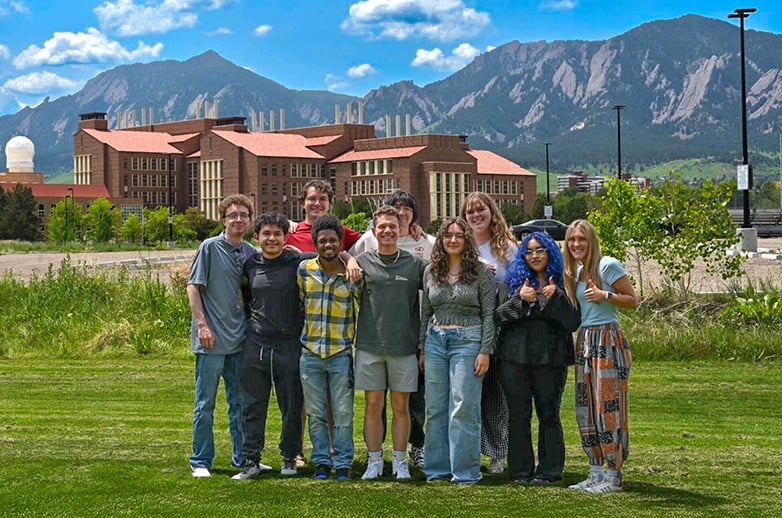Student Highlight: Kayla Muzquiz
July 8, 2025
Strategic Marketing & Communications
For Kayla Muzquiz, education has always been about more than earning a degree, it’s been about building a foundation for meaningful change. A former foster youth who moved often throughout San Antonio, Kayla found consistency in an unexpected place: the Alamo Colleges. “No matter where I ended up, there was always an Alamo College nearby,” she said. So when it came time to start her college journey, Palo Alto College on the Southside felt like a natural fit and ultimately, began to feel like home.
After earning her Associate of Arts in Psychology from PAC, Kayla briefly enrolled in a university to continue her studies. However, she soon felt a longing for the sense of community and warmth she had come to appreciate at PAC. That’s when she discovered the college’s newest offering: the Bachelor of Applied Technology in Operations Management (B.A.T.).
“I knew I wanted to start a nonprofit that connects people in need with the resources to meet those needs,” Kayla explained. “But to do that, I needed to understand the business side of things.”
The B.A.T. program provided exactly that. Designed to prepare students for leadership roles across industries, the program blends business fundamentals with real-world applications in operations management. For Kayla, the program's hybrid format with flexible options for online and in-person courses was a perfect match. As an expectant mother with a busy schedule, having the ability to customize her course load was essential.
“It’s rigorous. You have to be engaged and manage your time well. But the professors are so supportive, and they truly want to see you succeed.” Her coursework has already covered everything from human resources and accounting to project management and all skills she’s applying as she develops the business plan for her nonprofit.
As a former work-study in the B.A.T. Department, Kayla had the unique opportunity to engage even more deeply with her professors and peers. “Working with the department gave me a chance to provide feedback, understand more about the resources available, and build connections that have helped me,” she said. She points to 24-hour online tutoring and the encouragement to build relationships with faculty as major assets to student success.
What stands out most about the B.A.T. program, Kayla says, is the diversity of its students and the real-world experience they bring to the table. “Some of my classmates are returning to school after years away. Others are switching careers or trying to move up in their current jobs. The different perspectives make discussions richer and more insightful.”
Now on track to graduate in Fall 2026, Kayla is well on her way to making her vision a reality. Her advice for future B.A.T. students? Don’t be afraid to reach out, ask questions, and stay organized. “If you can, try at least one in-person class. It’s a different experience, and it really helps you feel part of the community.”
Looking ahead, Kayla sees limitless potential in operations management. “It’s a field with so many applications. No matter what your goals are, whether you want to run a business, lead a nonprofit, or become a leader in any field, you’ll use these skills.”
Her journey is a testament to the power of opportunity, resilience, and community. Through the B.A.T. program at Palo Alto College, she’s proving that students can build a future that’s not only successful, but deeply rooted in purpose.
To learn more about the B.A.T. program at Palo Alto College, visit alamo.edu/pac/ops-mgmt.
Latest ACD News
- NVC Retrospective : A Time of Growth(2007-2010) Step back in time to an exciting era at NVC! Discover how groundbreaking expansions, prestigious national recognitions, and a surge in student enrollment transformed the campus from 2007 to 2010. From new buildings and a central lake to innovative parking solutions, learn how NVC laid the foundation for its remarkable growth and success. Earth Day 2007 was exciting at NVC – the college broke ground on Juniper Hall and Redbud Learning Center and pledged preservation alongside expansion. The northeast side of campus began changing daily, and NVC was getting ready to serve more students from Alamo Ranch and other new neighborhoods growing nearby. Recognitions Two significant recognitions for NVC that year included the Texas Award for Performance Excellence from the Quality Texas Foundation and a recognition for NVC’s development math program from the National Association for Developmental Education (NADE). At the time, NVC’s developmental math program was the only one in the nation to receive the NADE recognition at the Distinguished Level. In 2007, 96% of students surveyed said they would recommend NVC to others. This, along with other factors, may have helped the college with the Fall 2008 enrollment, which soared to 11,961. That was a 4% increase over the projected enrollment for 2015. A year later, NVC was recognized by Community College Week as one of the Top 100 associate degree producers. The publication ranked NVC 10th in the nation among those colleges that saw the biggest increase in students’ degree attainment between 2003 and 2007. This was based on data from the U.S. Department of Education Integrated Postsecondary Education Data System, or IPEDS. Another college accolade came in 2009 when NVC was recognized for exemplary practices in integrating academic and career advising by the National Academic Advising Association, an organization that promotes quality academic advising in institutions of higher education. Expansion Through the collaborative work of NVC’s College Services and other departments, the college opened five new buildings in 2009: Redbud Learning Center, Juniper Hall, Live Oak Hall, Cypress Campus Center (now the Cypress Cultural Center), and the Palmetto Center for the Arts. This added 319,947 square feet to the existing campus. The lake, Lago Vista, in the heart of the campus, united the surrounding buildings and became a central point of campus life for employees, students, and visitors. As new buildings opened, the existing buildings were renamed for Texas native trees, while the parking lots were named for native flowers. The Learning Center became Manzanillo Hall, the Academic Building became Mountain Laurel Hall, the College Commons became Huisache Hall, the Community and Technology Center became Pecan Hall, and the physical plant became the Texas Persimmon Physical Plant. During this period of expansion, the Northwest Vista College community encountered considerable parking challenges. NVC leadership promptly addressed this by collaborating with neighboring SeaWorld San Antonio, securing a temporary parking lot and providing shuttle services for students, faculty, and staff. This effective solution remained in place until the Prickly Pear Parking Garage was completed a couple of years later. This growth mirrored NVC’s academic achievements: in 2009, students earned 827 associate degrees and certificates, a figure that surged to 1,289 just one year later. By Fall 2010, student enrollment climbed to 15,921. These impressive growth figures underscore NVC’s commitment to accommodating its expanding community while consistently elevating student success. Watch for next month’s Retrospective: 2011 – 2014. Do you have a 30 Year story to share? Please send a short summary of your story idea to NVC-News@alamo.edu. We will contact you for more information. VISIT NVC'S 30 YEAR CELEBRATION WEBPAGE
- NVC Workshop Empowers Faculty to Transform Courses for an Enriched Student ExperienceA recent Northwest Vista College (NVC) workshop empowered faculty to transform courses for an enriched student experience. NVC faculty found that a well-designed Canvas course, interactive activities, and even a reduced first-week workload can make all the difference. Eleven brave faculty members this summer took on the challenge to redesign their Canvas course in an attempt to help students be more successful. The summer workshop was the first iteration of its kind from NVC’s new Center for Teaching and Learning. The course was co-facilitated by Chad Mueller and Sarah Ball, who are also co-directors of the new Center, located on the second floor of Manzanillo Hall. “I was blown away with what I saw,” said NVC President Dr. Amy Bosley at the Aug. 7 presentation event. “Think about what this will mean for the student experience? If we can just help three more students be successful in class, then this program was worth the investment.” Mueller said the new program was meant to give busy faculty a fresh look at their course from a compassionate lens. He added that faculty were encouraged to use a sleek new Canvas template, buttons, and navigation prompts to help students easily get through the course, along with a variety of technology tools to enhance learning. The course included expert speakers: Migdalia Garcia, Veronica Luna, Melinda Zepeda, and Alamo Colleges Online Instructional Designer Diana McCurtain-Talbert. For instance, English and reading instructor Britt Posey incorporated resources and links into her Canvas shell to help parenting students by connecting them with needed resources and sharing mentoring opportunities. She also incorporated compassionate language from a caring perspective. Hector Trevino said the summer workshop allowed him to focus on the student experience in his college algebra class, particularly on the students’ experience interacting with peers. To ease math anxiety, Trevino uses numerous videos and assigns no work during the first week of class.Yvette Uresti, a pre-calculus instructor, said redesigning her online course involved significantly shortening her syllabus and using AI to make the language more compassionate. She also appreciated using a modern, well-organized Canvas template. NVC Vice President for Academic Success Dr. Sara Lozano expressed her gratitude to the faculty who spent time in this workshop, noting their dedication to continuous improvement. “Even small changes make a big difference for students,” Lozano added. To learn more about this workshop, contact Sarah Ball or Chad Mueller.
- NVC President Dr. Amy Bosley Honored with YMCA Youth Development Volunteer AwardNVC President Dr. Amy Bosley was honored with the 2024 YMCA Youth Development Volunteer Award! She earned this award for being a driving force behind youth development in San Antonio, thanks to her vision and leadership. Dr. Bosley is recognized for engaging with local organizations to build a better future for all and for being an inspiring role model. Her passion for students, education, and community is making a significant impact. As the YMCA shared, “Her holistic approach to education and student support aligns seamlessly with the YMCA’s mission.” “I am deeply honored to receive the YMCA Youth Development Volunteer Award,” said Dr. Bosley. “The YMCA’s mission and our work at Vista share a common purpose - empowering young people with the skills, confidence, and support they need to thrive. This recognition is a testament to the incredible partnerships in San Antonio that are opening doors of opportunity and building a brighter future for our community.”
- NVC Students Build Futures with AlamoEXPERIENCENorthwest Vista College (NVC) students can gain a competitive edge in their academic and professional pursuits through AlamoEXPERIENCE, which goes beyond traditional transcripts to showcase their full potential. AlamoEXPERIENCE is an online platform that NVC students use to engage in campus life and develop crucial leadership skills. By joining student organizations, participating in volunteer initiatives, and taking on leadership roles, students can enrich their college experience and build a verifiable "Experience Transcript." "AlamoEXPERIENCE is a tremendous advantage for our students," NVC Career and Experiential Learning Director Doreen Abrams said. "It allows them to document their valuable co-curricular and extracurricular activities, including professional development in leadership, which are often overlooked but are incredibly important to their growth, job search, and future success." This innovative transcript provides a comprehensive record of a student's involvement outside the classroom, highlighting their leadership, volunteerism, and the diverse skills they've acquired. Unlike a standard academic transcript based solely on grades and courses, the Experience Transcript provides a holistic view of a student's development. The benefits of the Experience Transcript can be far-reaching. NVC students can leverage this document when applying for scholarships, providing concrete evidence of their commitment and initiative. It's also a powerful tool for university and graduate program applications, demonstrating a well-rounded profile beyond academic achievements. And importantly, the Experience Transcript is a significant asset for job seekers, as it indicates marketable skills and real-world experience to potential employers. Northwest Vista College encourages all students to explore the opportunities available through AlamoEXPERIENCE and begin building their personalized Experience Transcript, paving the way for a brighter future.
- NVC’s Digital Video & Cinema Production Team Explores New TechniquesNorthwest Vista College’s Digital Video & Cinema Production (DVCP) team recently hosted a workshop with producer David Sanders, a trainer and industry expert from Los Angeles-based consultancy CG Pro. DVCP Program Coordinator Noelia Santos said the three-day workshop was designed to help NVC instructors integrate new, advanced virtual production techniques into their curriculum. “We are planning to introduce the virtual production workflow gradually into our classes over the coming academic year to help our students learn these cutting-edge tools used in today’s film, gaming, and television industries,” Santos said. “These skills will set them apart in the workforce as they enter the industry.” The growing role of virtual production and the importance of adaptability in this rapidly evolving industry are among the topics Sanders covered. He also explained how emerging technologies are reshaping traditional production pipelines. “His experience helped students understand the real-world expectations and collaborative nature of professional sets blending virtual and live production,” said Santos. NVC students working toward an Associate of Applied Science degree in Digital Video & Cinema Production are trained in all phases of video and cinema production and gain hands-on experience using industry-standard equipment and software. Students are being prepped to take on jobs such as video editor, cinematographer, producer/director, and more. Santos said currently there is a strong demand for video editors, camera operators, content creators, and virtual production specialists. “With the rise of streaming platforms and digital marketing, skilled professionals in video production are needed across entertainment, corporate, and nonprofit sectors,” she added. The role artificial intelligence (AI) plays in this industry is evident and Santos said AI tools are increasingly being integrated into instruction. NVC students are using AI-assisted editing platforms such as Adobe Premiere Pro that streamline post-production tasks including color correction, transcription, and audio cleanup. Santos explained that these AI tools help students understand how automation can enhance efficiency while still requiring a creative human touch. For students planning to further their education in this field, NVC’s Digital Video & Cinema Production program supports the transfer to a Bachelor of Applied Arts and Sciences (BAAS) degree. In addition, the program maintains partnerships with several local media and production companies. Students can apply for internships through the FLMC 2280 course, which requires instructor approval and a confirmed placement with an industry partner. Whether students choose to enter the workforce or transfer to a four-year institution, Santos wants them to know that persistence and passion are key. “Stay curious and keep learning — this industry evolves quickly,” she said. “Build a strong portfolio, seek mentorship, and take advantage of internships and networking opportunities.” To learn more about the program, visit the NVC Digital Video & Cinema Production webpage.
- NVC Student Participates in Solar Research ProgramPhoto (above) courtesy of BSA REU Congratulations to NVC student Tiara Stribling who is one of 10 students in the U.S. selected to participate in the 2025 Boulder Solar Alliance Research Experience for Undergraduates. The National Science Foundation is funding the 10-week program that began in May and runs through early August at the University of Colorado Boulder. Stribling is currently conducting research at the university’s Laboratory for Atmospheric and Space Physics under the mentorship of Dr. Odele Coddington. The research involves analyzing data from the Spectral Irradiance Monitor and focusing on how variations in infrared wavelengths impact solar variability models, which is essential for understanding solar energy’s influence on Earth’s climate. “This experience is giving me deeper insight into solar and space physics and its real-world applications,” said Stribling. “I learned that space research is more than just looking at data and making analyses, it's also how to effectively communicate your research, staying up to date with science policies, and the importance of collaborating with others.” The program includes a “boot camp” in solar physics and professional development seminars. Upon completion of the research, Stribling will present her findings in a formal scientific talk and poster session. As she wraps up her final semester in NVC’s computer science program, Stribling plans to continue her work-study position as a docent at the San Antonio Museum of Science and Technology. She has also applied for the NASA L'SPACE program and intends to pursue an internship at the Southwest Research Institute.









